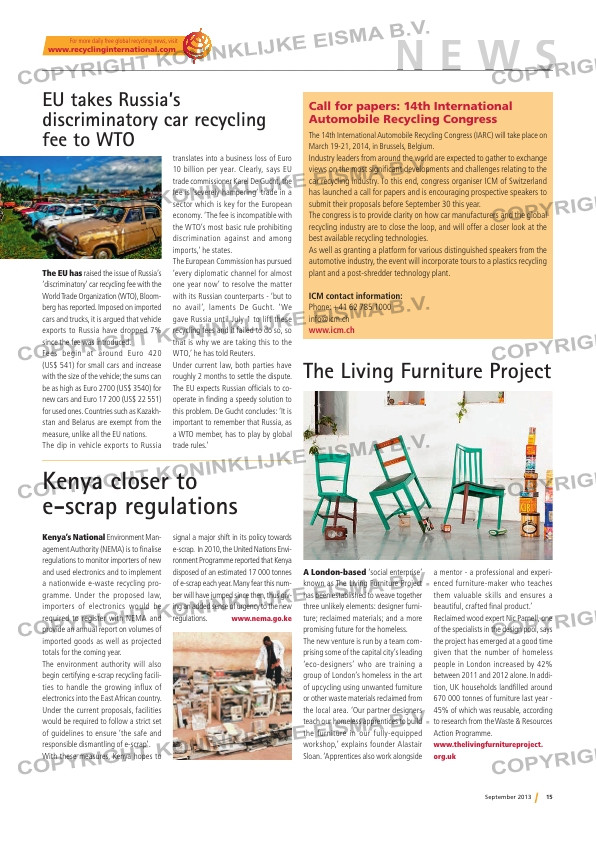Page 15 from: September 2013

N E W S
15September 2013
For more daily free global recycling news, visit
www.recyclinginternational.com
A London-based ‘social enterprise’
known as The Living Furniture Project
has been established to weave together
three unlikely elements: designer furni-
ture; reclaimed materials; and a more
promising future for the homeless.
The new venture is run by a team com-
prising some of the capital city’s leading
‘eco-designers’ who are training a
group of London’s homeless in the art
of upcycling using unwanted furniture
or other waste materials reclaimed from
the local area. ‘Our partner designers
teach our homeless apprentices to build
the furniture in our fully-equipped
workshop,’ explains founder Alastair
Sloan. ‘Apprentices also work alongside
a mentor – a professional and experi-
enced furniture-maker who teaches
them valuable skills and ensures a
beautiful, crafted fi nal product.’
Reclaimed wood expert Nic Parnell, one
of the specialists in the design pool, says
the project has emerged at a good time
given that the number of homeless
people in London increased by 42%
between 2011 and 2012 alone. In addi-
tion, UK households landfi lled around
670 000 tonnes of furniture last year –
45% of which was reusable, according
to research from the Waste & Resources
Action Programme.
www.thelivingfurnitureproject.
org.uk
Kenya’s National Environment Man-
agement Authority (NEMA) is to fi nalise
regulations to monitor importers of new
and used electronics and to implement
a nationwide e-waste recycling pro-
gramme. Under the proposed law,
importers of electronics would be
required to register with NEMA and
provide an annual report on volumes of
imported goods as well as projected
totals for the coming year.
The environment authority will also
begin certifying e-scrap recycling facili-
ties to handle the growing influx of
electronics into the East African country.
Under the current proposals, facilities
would be required to follow a strict set
of guidelines to ensure ‘the safe and
responsible dismantling of e-scrap’.
With these measures, Kenya hopes to
signal a major shift in its policy towards
e-scrap. In 2010, the United Nations Envi-
ronment Programme reported that Kenya
disposed of an estimated 17 000 tonnes
of e-scrap each year. Many fear this num-
ber will have jumped since then, thus giv-
ing an added sense of urgency to the new
regulations. www.nema.go.ke
The Living Furniture Project
Kenya closer to
e-scrap regulations
The EU has raised the issue of Russia’s
‘discriminatory’ car recycling fee with the
World Trade Organization (WTO), Bloom-
berg has reported. Imposed on imported
cars and trucks, it is argued that vehicle
exports to Russia have dropped 7%
since the fee was introduced.
Fees begin at around Euro 420
(US$ 541) for small cars and increase
with the size of the vehicle; the sums can
be as high as Euro 2700 (US$ 3540) for
new cars and Euro 17 200 (US$ 22 551)
for used ones. Countries such as Kazakh-
stan and Belarus are exempt from the
measure, unlike all the EU nations.
The dip in vehicle exports to Russia
translates into a business loss of Euro
10 billion per year. Clearly, says EU
trade commissioner Karel De Gucht, the
fee is ‘severely hampering’ trade in a
sector which is key for the European
economy. ‘The fee is incompatible with
the WTO’s most basic rule prohibiting
discrimination against and among
imports,’ he states.
The European Commission has pursued
‘every diplomatic channel for almost
one year now’ to resolve the matter
with its Russian counterparts – ‘but to
no avail’, laments De Gucht. ‘We
gave Russia until July 1 to lift these
recycling fees and it failed to do so, so
that is why we are taking this to the
WTO,’ he has told Reuters.
Under current law, both parties have
roughly 2 months to settle the dispute.
The EU expects Russian offi cials to co-
operate in fi nding a speedy solution to
this problem. De Gucht concludes: ‘It is
important to remember that Russia, as
a WTO member, has to play by global
trade rules.’
EU takes Russia’s
discriminatory car recycling
fee to WTO
Call for papers: 14th International
Automobile Recycling Congress
The 14th International Automobile Recycling Congress (IARC) will take place on
March 19-21, 2014, in Brussels, Belgium.
Industry leaders from around the world are expected to gather to exchange
views on the most signifi cant developments and challenges relating to the
car recycling industry. To this end, congress organiser ICM of Switzerland
has launched a call for papers and is encouraging prospective speakers to
submit their proposals before September 30 this year.
The congress is to provide clarity on how car manufacturers and the global
recycling industry are to close the loop, and will offer a closer look at the
best available recycling technologies.
As well as granting a platform for various distinguished speakers from the
automotive industry, the event will incorporate tours to a plastics recycling
plant and a post-shredder technology plant.
ICM contact information:
Phone: +41 62 785 1000
[email protected]
www.icm.ch
p08_NEWS.indd 15 02-09-13 16:59



